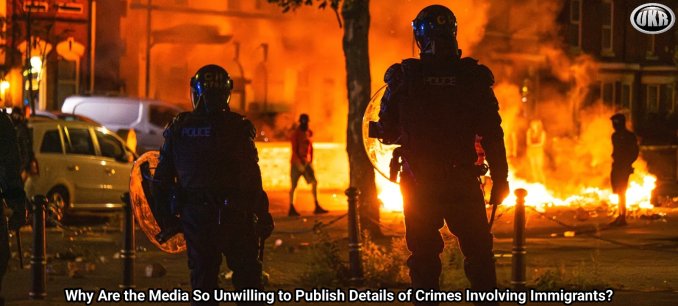
Why are the media so unwilling to publish details of crimes involving immigrants?
SOCIAL media was alive on Tuesday night with reports of protests outside the CityWest migrant hotel on the outskirts of Dublin. Among other media organisations, the BBC covered the incident, with the headline: ‘Arrests after violent protest outside Dublin migrant hotel’.
Not from the headline nor anywhere in the BBC’s report could you glean any reason why more than a thousand people should have assembled outside a Dublin hotel on a cold, wet October night.
It takes social media to reveal the cause of the unrest: the alleged rape of a ten-year-old girl by an illegal immigrant resident at the hotel, said to be of Algerian origin and subject to an unenforced deportation order.
The man has been charged, but that is the subject of an entirely separate BBC report which confines its headline to the minimalist: ‘Man in court charged with sexually assaulting ten-year-old girl’.
The report itself does not mention the man’s background, although we are told that he had an ‘Arabic interpreter’. The report makes no link to the CityWest hotel, even though the ‘assault’ is said to have taken place at Garter Lane, Saggart, Co Dublin, which just happens to be the address of the hotel.
Furthermore, there is no specific mention of rape – the only way that can be ascertained is because the report sets out the legislation under which the man has been charged: Section 2 of the Criminal Law (Rape) (Amendment) Act 1990, as amended by Section 37 of the Sex Offenders Act 2001.
Nor, from the BBC reportage of the protests, would you learn that the use of CityWest – once a popular tourist hotel – as a ‘migrant hub’ was strongly opposed by locals, especially recently when the Irish government decided to spend almost €150million to buy the hotel as a semi-permanent facility for use by the Irish government’s International Protection Accommodation Services (IPAS).
The Telegraph wasn’t very much better, headlining: ‘Irish police attacked with missiles outside migrant hotel’. Only in the sub-head do we get an inkling of what this as all about, as the paper tells us: ‘Protest turns violent as police car set on fire and stones hurled at officers after alleged sexual assault on girl’.
Even in the text there is no mention of a rape allegation or the age of the girl, with the emphasis very much on the ‘violent disorder’ and a long condemnatory statement by Justice Minister Jim O’Callaghan who complains of people ‘the weaponising of a crime by people who wish to sow dissent in our society’.
This line makes the headline in the Guardian which proclaims: ‘Dublin police condemn “thuggery” after protest outside hotel housing asylum seekers turns violent’. Nowhere in the article is there a mention of rape. Nevertheless, the Guardian is prepared to tell us that Ireland’s child and family agency Tusla has said the alleged victim of ‘this week’s incident’ had been in state care at the time and had ‘absconded’ during a recreational trip to the city centre.
We are also allowed to know that the taoiseach, Micheál Martin, while condemning the ‘violent disorder’ and ‘vile abuse’ against police in a statement, would only acknowledge ‘the concern, anger and worry of many people’ over the alleged assault. ‘Clearly,’ he said, ‘there has been failure here in terms of the state’s obligation to protect this child.’
And so it goes on. The Independent; the i Paper; even the Mail, which normally revels in lurid details, will only tell its readers: ‘The violence followed the alleged sexual assault of a ten-year-old girl near the asylum site in the early hours of Monday morning’.
The one exception is the Express, which offers the full Monty in a single headline: ‘Police van in flames as migrant hotel protest explodes after alleged rape of ten-year-old’, illustrating the ready availability of the detail missing elsewhere.
The diffidence of the English media in offering the full facts of a disturbing case can hardly be accidental. All too often, across a wide range of reports concerning violence and immigration – especially related to asylum seekers – we see a marked reticence to publish details.
This extends to reporting on murders and other crimes without mentioning the nationality or ethnicity of the suspect, as we saw with Southport killer, Axel Rudakubana, infamously described as a ‘Welsh choirboy’.
There is too much consistency in the omissions and circumventions to indicate that there is anything other than an agenda involved. From where this originates is never stated, but it is unlikely that there is official censorship – the are no D-notices or their equivalent, in domestic affairs.
Bearing in mind that, throughout the Second World War, there was no specific censorship law covering newspapers, with national editors all conforming to a voluntary code, it could be that we are looking at a ‘mindset conspiracy’, where a group of like-minded individuals all behave the same way, even though there is no central coordination.
Whatever the driver, it becomes ever clearer that on the sensitive – and potentially inflammatory – issue of illegal immigration (and, to an extent, immigration generally) there is an active process of omission which amounts to censorship by any other name.
This article appeared in Turbulent Times on October 22, 2025, and is republished by kind permission.
Featured image: Shutterstock






Leave a Reply